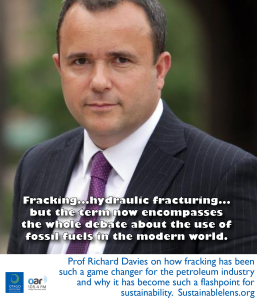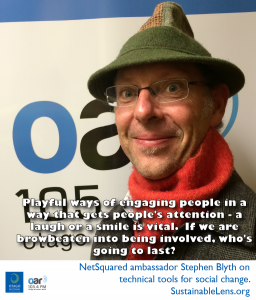Fracking…hydraulic fracturing… but the term now encompasses the whole debate about the use of fossil fuels in the modern world.
Professor Richard Davies on how fracking has been such a game changer for the petroleum industry, what are its costs and benefits, and why it has become such a flashpoint for sustainability.
Professor Davies took up the post of Pro-Vice-Chancellor (Engagement & Internationalisation) at Newcastle University. He is a petroleum geologist, with a particular focus on hydraulic fracturing used to exploit shale gas and oil. Richard is an advisor to the All Party Parliamentary Group on Unconventional Oil and Gas. He tells us that he is agnostic about the issue of shale gas and oil exploitation but very outspoken about his commitment to expanding the evidence base in the European fracking debate. He is Project Lead of ReFINE.
We ask Prof Davies if fracking is inherently damaging – either in its own right or for its implications for climate change, and why it has become a poster child for unsustainability. But first, we ask him about his own voyage of discovery, and what led him to train as a petroleum geologist.
Talking points
My job in the petroleum industry was where to put the next well…but I found I was more interested in fundamental questions about geoscience
Fracking is an example of how technology has improved and allowed us to access oil and gas that no one thought we could get
The reason we stop getting oil and gas will because it is so damaging or because it becomes so expensive to get hold of it that no one would pay for it.
It may be that oil becomes a precious substance – no one would dream of burning it – that would be crazy…it would just be used for a select group of products or processes for which there is no alternative.
Technology may unlock more oil reserves in the future, but the key question is do we really need to burn it? Perhaps we shouldn’t be burning it and using it for something else.
Peak oil was turned upside down by fracking
Oil and gas companies are answerable to shareholders, and their shareholders are you and I.
A cup of oil contains a huge amount of energy, and it is difficult to replicate that and produce the same amount of profit from renewable energy…so unfortunately it’s an unequal battle
(Comparison of coal to renewable energy) I don’t believe a Russian man…in Russia mining some coal, putting it on a train to a boat, the boat coming to the UK, putting the coal on another train, to a power station, and thus burning it and then capturing the C02 at that point – because we haven’t captured all the C02 along the way
In a cradle to grave carbon footprint, that coal has come a long way…
Energy storage is so important for renewables
If we put the R&D spend in the oil and gas industry into other things such as energy storage…wow.
Fracking…hydraulic fracturing… but the term now encompasses the whole debate about the use of fossil fuels in the modern world.
The whole fracking process has a lot more intensity to it than drilling a normal well because of the need for fracking fluid, and the chemicals required, and the disposal of that
We come from an agnostic, neutral perspective – we’re not for or against fracking – and therefore we’re unpopular with both sides of the debate…we’ve positioned ourselves just right, we’re neutral, we’re academics.
The long term impact will be in looking after the bore holes…in 50 years time.
Every extractive industry has downsides…this isn’t rocket science, we need to understand the risks and manage them
This is a fossil fuel, that won’t do climate change any good. You can reduce it…but we haven’t got a replacement right now
Some of the reasons people don’t like fracking is because it is an extractive industry, it won’t help climate change and there is a level of risk
There’s a huge debate about renewables versus fossil fuels and fracking is right in the centre of that debate.
There’s the technical stuff and the social stuff, the two are very linked and it ain’t all about the science
We have a handle on the science…but not enough…lots of good questions we don’t have the answers to
In a way, industry has made this all happen, but the questions haven’t been solved at the same rate the industry has been deployed.
The questions have reached a bit of a crescendo, coming from all quarters, we have a handle on it, but we don’t know everything.
I’ve learned a lot in the last four years…firstly admitting we don’t have all the answers, listening to people, I’ve never thought “that’s not a good question”. Of course its a good question, I’ve huge respect for people who get involved and ask questions. That’s forced us scientists to look at things, it’s forced industry to look as well, and I don’t think industry knew the answers to some of the questions members of the public were asking.
Companies have got better at taking the public questions seriously, to research them and to provide good answers.
We’re often training someone to be highly specialised, but we also need more cross disciplinary people who can see energy from across the spectrum
We need a new breed of technical people who can see the world in a slightly different way.
We need people to be open and frank and aware of more than their own little postage stamp piece of the puzzle.
(Superpower) Think of the long term, not just the next five years.
(Success) changing the law in the UK so companies not allowed to frack with 1km or the surface, therefore protecting people’s water supplies.
(Activist) No. For me that is a personal question, personally about me living on my farm with solar panels, my two kids and my wife. I’m a scientist I come in to do this as neutral person. I don’t want to mix my personal views – my personal setting, my personal history, my background, with the science that I do – I thinks that’s an incorrect mixture
(Motivation) Discovery
(Challenge) Make the project more international, we’ve been a bit Europe-centric…continue the job we’ve done successfully but on an international stage
(Miracle) Long term independent funding, we’ve fought hard to be independent,
(Advice) Keep asking good questions.
Keeping the light shone on the fossil fuel industry will make for a better world.
This was conversation was recorded at Newcastle University in September 2015. The Framing Fracking paper mentioned is here.


